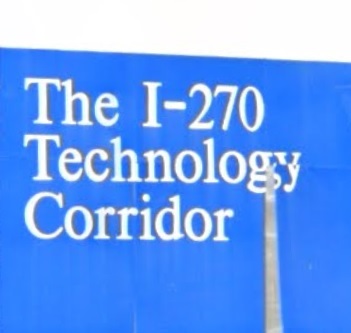Sharing How Technology Affects Our People
TECHNO-PATH FROM POVERTY
Reflect on this canyon-deep disconnect:
Maryland’s I-270 Technology Corridor hosts some of the most cutting-edge research companies in the country. With dozens of biotech enterprises, Time magazine dubbed it DNA Alley. It was Craig Venter, as president of Celera Genomics, headquartered in Rockville, who sequenced the human genome. AstraZeneca, which has developed a COVID-19 vaccine, is there too. The scores of companies in the corridor provide rewarding and remunerative careers for tens of thousands of individuals. And they are always looking for more good minds. It’s an achiever’s paradise!
Now drive 40 miles up I-95 and you’ll find dystopian, inner-city Baltimore. It’s usually in the Top 5 of America’s most dangerous cities. Each year, over 300 individuals, mostly blacks, are murdered there. In 2020 more than half the city’s 32 candidates for mayor, running to replace Catherine Pugh, who’d pled to criminal charges, themselves faced criminal charges. A Pugh predecessor, Sheila Ann Dixon, resigned as mayor in 2010 after her criminal convictions. The mayor between those two criminals, Stephanie Rawlings-Blake, in 2015 endorsed the criminal rioters burning the city, declaring “We gave those who wished to destroy, space to do that.”


But the real crime is what is done to young minds—77 percent black, 14 percent Hispanic—in the city’s schools. A 2018 survey found that of some 1,300 Maryland state schools, 35 received a low rating of “1” out of “5”; 23 of those schools were in Baltimore. Some 13 Baltimore high schools had zero students proficient in math. Bullying and violence in those schools are endemic. In one shocking case, a student in Augusta Fells Savage Institute of Visual Arts, a city high school, only passed three classes in four years, yet was still in the top half of the class and was passed to upper grades. And the problem isn’t lack of funds; the city spends about the same per pupil as does prosperous Montgomery County, which has some far higher-rated schools.
The companies in the I-270 Corridor would welcome more bright young minds from Baltimore. Yet Baltimore officials have failed completely to make the city schools reservoirs of talent for those tech companies or almost any others.
The disconnect between the need for educated, innovative, and entrepreneurial minds to create our techno-future and the failures of government-dominated schooling is not only a Baltimore problem. For decades, citizens of poor, minority neighborhoods across the country—in Philadelphia, Cleveland, Detroit, St. Louis, New Orleans—have suffered the same sad status-woe. Chicago, with 769 murders in 2020, devoted the largest portion of its school budget—37 percent—to bloated teacher pensions, much more than the resources that went to schooling students. In spite of trillions of dollars expended for every conceivable welfare or reform program at all government levels, serious poverty problems persist.
So what does this decades-long national disgrace have to do specifically with the future techno-economy of human achievers? As already noted, millions more minds will be needed to create that future. That should be enough to have tech companies, entrepreneurs, visionaries, and true reformers more engaged in poor, minority communities. Many, in fact, are so engaged.
But the opportunities and self-interest go beyond that. The potential for personal success is enhanced in a culture that values and incentivizes human achievement. Not excuse-making! Not acquiescing passively in cultural inertia and pessimism! And morally healthy humans want to live, share joys, and benefit from community with like-valued individuals!
What a possible triple achievement for companies, entrepreneurs, visionaries, and true reformers: to usher in that prosperous future; to enlist as creators and beneficiaries of that future those trapped in impoverished pockets of despair; and to meet a moral challenge and solve a problem that governments, for decades, have not been able to solve because those governments helped create it!
The path to this better tomorrow must start with breaking out of anti-individualist, interlocking mental and dogmatic chains, and associated degrading public policies. This means:
- Reject lower standards, quotas, and tokenism.
Individuals should have access to jobs, professions, education, and commercial and civic opportunities regardless of race or ethnic origin. As government-imposed racial legal barriers were being eliminated half a century ago, there were well-meaning attempts to remedy past wrongs by offering special access for those who were denied those opportunities. But most attempts today are counterproductive.
Rather than working to better educate young minds to meet the highest standards, post-modernist elites call for eliminating standards, going even lower than the "the soft bigotry of low expectations" of past decades. But do you really want to fly in a plane designed by an engineer who really didn’t understand stress in metals but passed classes because of lowered standards in the name of “racial justice”? A more realistic example is teachers who are certified for classrooms because of lower standards and then provide low-quality schooling for thousands of black and Hispanic children. Or the principal, with an annual salary of nearly $200,000, of the Baltimore high school that had a student who only passed three classes in four years yet was in the top half of his class.
The ultimate immorality of this approach is seen in the Oregon Board of Education telling teachers that asking for the correct answer in math manifests “white supremacy.” We see post-modernists destroying young minds by issuing a report calling for Dismantling Racism in Mathematics Instruction.
Low standards, quotas, and tokenism also give rise to a usually unstated, subconscious assumption that a black or other minority has a particular job or position because they’re somehow mentally incapable of achieving such a position on their own, an insult to all those who have, in fact, earned their achievements.
- Reject neo-racism and “Identity Politics.”
The ugly racism of the past, with too many whites looking upon blacks and other groups as somehow inherently inferior, has declined precipitously for decades. Martin Luther King’s dream “that my four little children will one day live in a nation where they will not be judged by the color of their skin but by the content of their character” has been becoming a reality. But sadly, in recent years we’ve seen the viral spread of ugly neo-racism on the American political left. We see an obsessive focus on accidents of birth, an obsession that inculcates blacks especially with the assumption that skin color rather than what they make of themselves in life is how they should judge themselves and be judged. It also infects them with morally ugly envy, hatred of individuals of any race or group who achieve through their own efforts. What more killing virus to inject into a human soul, to create resentment and an entitlement mentality?
little children will one day live in a nation where they will not be judged by the color of their skin but by the content of their character” has been becoming a reality. But sadly, in recent years we’ve seen the viral spread of ugly neo-racism on the American political left. We see an obsessive focus on accidents of birth, an obsession that inculcates blacks especially with the assumption that skin color rather than what they make of themselves in life is how they should judge themselves and be judged. It also infects them with morally ugly envy, hatred of individuals of any race or group who achieve through their own efforts. What more killing virus to inject into a human soul, to create resentment and an entitlement mentality?
Novelist/philosopher Ayn Rand rightly called racism a barnyard version of collectivism, treating individuals like dumb animals. She wrote, “It is hard to say which is the more outrageous injustice: the claim of Southern racists that a Negro genius should be treated as an inferior because his race has ‘produced’ some brutes—or the claim of a German brute to the status of a superior because his race has ‘produced’ Goethe, Schiller and Brahms.” She puts “produced” in quotations because she rightly believes that our race or group doesn’t “produce” us but, rather, that we produce ourselves. (See “Identity Politics vs. Human Achievement” for a fuller discussion.)
Neo-racism also feeds the nascent white supremacist attitudes that, like weeds thought to have been rooted out, are beginning to grow again.
Unlike racism in the past, which often came from poorer, uneducated whites, the neo-racism plague comes from prosperous elites with college educations—indeed, many of them dominate college faculties—who are in leadership positions in media, entertainment, civic groups, religions, and most social institutions. Neo-racism no doubt grows from several sources. It is from moral minimization of individuals, their unique natures, and their right to liberty to live as they choose. It is to cover up the failures of their policies that have created so much misery for minorities. It is to virtue-signal to distract from those failures or to avoid the tough work of changing those policies and attitudes. Or maybe they’re just cowards. Whatever the cause, those who want to open a path for all individuals, especially minorities, to a prosperous techno-future must fight openly and unapologetically against neo-racism.
- Reject the cancel culture.
The ultimate crime against a living human is the murder of what makes us all most human: our minds. The cancel culture and its purveyors seek to shut down thinking, to guilt-trip or intimidate individuals into shutting down their minds. Intentional and malicious insults against any individual based on race, ethnicity and sexual preference should never be tolerated. But purveyors of the cancel culture look for any word, question, communication, or symbol they can claim offends them and they then demand we act immediately to sanction their emotional irrationality and follow whatever censorship or self-flagellation they dictate. They demand that we give ourselves the moral equivalent of lobotomies. Only honest, independent minds can understand the paths for individuals, communities, societies, and cultures from poverty to prosperity. Purveyors of the cancel culture are moral monsters who must, above all, be given no quarter.
We now turn to the synergy between Human Achievement Alliance priority issues. For those seeking to usher in the “Future Economy”—“Future Medicine and Life Extension” will be a driving force in that economy—and to liberate those trapped in dystopian pockets in the U.S. (and elsewhere), the path must begin with an “Education Revolution.”
We’ve seen innovative educational efforts for years. Dean Kamen’s FIRST (For Inspiration and Recognition of Science and Technology) organization has been working with students in STEM subjects since 1989. Students can access lessons as good as in any brink-and-mortar school through the online Kahn Academy and other such sites.
But four points are especially relevant for creating a techno-path for poorer minorities to a prosperous future.
- Choice in education.
The exponential techno-revolution, which burst forth almost half a century ago, came from innovators creating products for paying customers. Those customers made Intel, Apple, Microsoft, Google, Amazon and others rich, and competition for customers created incentives for those companies to continue to innovate and strive to produce ever-better products and services.
products for paying customers. Those customers made Intel, Apple, Microsoft, Google, Amazon and others rich, and competition for customers created incentives for those companies to continue to innovate and strive to produce ever-better products and services.
We need that dynamic in education and that means giving parents—the customers who seek the best for their children—the choice of which schools or programs would be best for educating their children rather than vesting that power in government officials. Those parents should allocate the money designated by government for their children’s education.
Further, all schools should meet their expenses by attracting those parents with excellent education options for their children just like Apple and Samsung cover their expenses by attracting customers to their excellent smartphones.
If individual parents of Baltimore school students allocated the money designated for their children, it might only take a few semesters to transform those schools-in-name-only into actual educational institutions.
Choice is the only choice.
- Entrepreneurs in education.
Entrepreneurs, enterprises, non-profits, and for-profits that want to help minorities break out of economic and cultural ghettos can become the providers of new, innovative educational services. They should compete for parent dollars.
Crucial to these efforts will be offering individualized learning. Today, the schooling system in the U.S. (and elsewhere) is an antiquated nineteenth century, assembly line, mass production approach in which students generally are given the same lessons at the same times taught in the same sage-on-the-stage ways. In the U.S., federally-mandated “Common Core” requirements double down on this failed one-size-fits-all approach.
But students are individuals and learn best in different ways. The great education pioneer Maria Montessori realized this, and her approaches have yielded the best results for a century. Educational entrepreneurs seeking to help students in poor, minority neighborhoods will, in fact, need to tailor their approaches to the reality of the cultures, backgrounds, and experiences of those students which, sadly, often include broken homes, crime, and lack of economic opportunity. But this tailored approach should not use the current situation as an excuse to lower standard, rather, education should be used to overcome those situations.
The future economy will not only need individuals trained in focused, specific skills. It will need individuals whose minds are nimble and entrepreneurial, who can adjust quickly to a fast-changing economy driven by exponential technologies. Thus, training in such thinking, including the “Socratic Method” so well explained in Habit of Thought, will certainly be a crucial part of any entrepreneurial education reform effort.
A crucial policy element for revolutionizing education, especially for those so ill-served by the current system, will be to allow education entrepreneurs to take over failing schools, reorganize them, and offer higher-quality educational services to parent-customers. When parents have the choice of how to spend their education dollars, and when schools must meet their expenses by attracting those dollars, failed schools in poorer communities will see substantial shortfalls in enrollment and revenues. It would clearly be better for those schools to improve rather than fail. Just like failing businesses can be saved under new ownership and management, so failing schools in a competitive market can be made competitive if educational entrepreneurs are allowed to take over.
- Apprenticeships.
Not every student needs to attend college to acquire knowledge and skills to be successful in life. Indeed, attending college with tuition paid for by government-backed loans is often a waste of an individual’s time and talent, burdening them when they graduate with huge future debts for degrees of little market value.
Apprenticeships are one means to bridge the disconnect between the current schooling system and the needs of enterprises for productive workers and individuals for remunerative, rewarding careers.
Traditional apprenticeships usually involve individuals training in blue-collar skills to become electricians, carpenters, plumbers, skilled construction workers and the like. Expansion of programs allowing for such training would especially help individuals in poorer inner cities just has, in the past, they helped members of various immigrant groups working their way to the American dream.
But apprenticeships can offer opportunities beyond these traditional careers. Some 70 percent of Swiss kids at the high school level go through “learn and earn” apprenticeship programs, career “try outs” that allow them to acquire skills, knowledge, income, and a path to a possible career rather than to debt, a useless college degree, and under- or unemployment. Further, more and more apprenticeships are for “new collar” careers in sectors like finance, tech, and pharmaceuticals. College, of course, often supplements such learning.
The Trump administration reformed labor regulations to expand access to apprenticeships by allowing private enterprises, colleges, and other nongovernmental entities to set standards for training programs.
CareerWise Colorado, co-founded by former governor, now Colorado Democratic Sen. John Hickenlooper, is one non-profit that brings the Swiss approach to the U.S.
The Maryland Apprenticeship and Training Council explains that it has made “great strides in promoting traditional and non-traditional Registered Apprenticeships to expand alongside the creation of new opportunities grounded in labor market demand in growing industries like information technology/cyber security, advanced manufacturing, and healthcare.” The program has 10,711 registered apprentices 3,781 businesses and 162 program sponsors. The problem is that there are 282,000 high school students in the state, meaning only 4 percent of students take advantage of this program.
Apprenticeship programs, which get students out of often-dysfunctional and dangerous schools, offer especially important paths for students in poor black and Hispanic minority communities.
- Work ethos and optimism.
I work with several groups helping to enable individuals in Africa and Asia to overcome their own entrapment in poverty and lack of opportunity caused by their own corrupt governments. I am struck by a crucial resource these individuals possess that gives them an ultimate long-term advantage over many individuals entrapped in poor American communities: Their attitudes!
They have a work ethos and they are optimists! They want the best for themselves as individuals and for their societies. They don’t make excuses or whine about being victims, though many certainly are. They understand that today, especially with new technologies, they can travel the path from poverty to prosperity, and they simply want opportunities to achieve through their own efforts.
This is where the need to break out of mental and dogmatic racist chains in American culture is especially crucial. American entrepreneurs, enterprises, non-profits, and for-profits that want to help minorities need to promote the optimistic, achievement ethos.
The future economy is coming fast. Minorities, blacks in particular, who have been trapped in poorer neighborhoods and even-poorer schools, in many ways have been left behind by current progress. They could continue to fall behind as exponential technologies enrich and enhance the rest of society. It is in the self-interest and is the moral thing to do for companies, entrepreneurs, visionaries, and true reformers to enlist these underserved individuals in the revolution to come.
This will require independence of mind, to move beyond the stale bromides perpetuated through our institutions and culture, to seek a clear understanding of the barriers to real progress and discern the productive path ahead. It will take courage to stand up to the inevitable, irrational venom that will be spit at those who defy the Zeitgeist.
It is possible that in decades to come, Baltimore and the many other cities in America (and around the world) will become dynamic incubators of the best minds that will join so many others to usher in a prosperous future of long, healthy lives. Joy in achievements can replace despair and hopelessness. The innovators and entrepreneurs who are creating technological and commercial breakthroughs can create these societal and cultural breakthroughs as well!
TECHNO-PATH FROM POVERTY ITEMS
- August 28, 2013, "Martin Luther King's Dream and Today's Racial Nightmare," by Edward Hudgins.
- April 4, 2010, "Thoughts on Racial Thinking," by Edward Hudgins